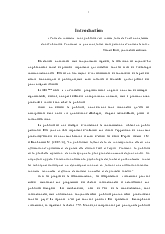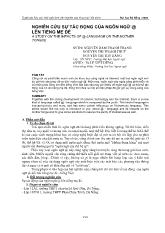The Effects of Bottom-Up Techniques in Teaching Listening Skills to First Year Students at the University of Fire Fighting and Prevention
- Người chia sẻ : vtlong
- Số trang : 47 trang
- Lượt xem : 17
- Lượt tải : 500
- Tất cả luận văn được sưu tầm từ nhiều nguồn, chúng tôi không chịu trách nhiệm bản quyền nếu bạn sử dụng vào mục đích thương mại
Bạn đang xem trước 20 trang tài liệu The Effects of Bottom-Up Techniques in Teaching Listening Skills to First Year Students at the University of Fire Fighting and Prevention, để xem tài liệu hoàn chỉnh bạn click vào nút DOWNLOAD LUẬN VĂN ở trên
It is undeniable that English is a means of international communication in the fields of science, technology, culture, education, economy and so on. It is not only the native language of about 300 million of speakers around the world but also the official language in many countries as well as second / foreign language in many nations in the world. In Vietnam, where people are carrying out the modernization and industrialization, English becomes more important. That is the reason why it has been made a compulsory subject in the curriculum of almost all universities in Vietnam. In UFFP, English is taught in 270 lesson periods which constitutes a major of the whole curriculum. However, English teaching is strongly influenced by the traditional methodology. Emphasis has been placed on the mastery of forms and vocabulary, rather than the language in use. Start a new line in learning English, listening seems to be the most difficult skill for first year students of UFFP. There are a number of possible reasons for this.
First, this might be due to the fact that most students lack necessary strategies to fulfill the listening tasks. Next, they often have difficulties in catching the meaning from the tape. Besides, they are afraid of listening and have no head for it. These are among the problems concerning non-major students of English as Brown (1994; p101) states: “Teaching beginners is considered by many to be the most challenging level of language instruction. Since students at this level have little or no prior knowledge of English on which to build, the teacher and accompanying techniques and materials become a central determiner in whether or not students accomplish their goals”.
Therefore, it is essential for teachers to find out some ways to help students overcome their difficulties, and make them feel more comfortable when practicing listening to English so as to assist them in approving their skills as well.
It is also essential to note that listening, as an efficient channel to provide comprehensible input for learners, its teachers should be paid due attention to from the very beginning.




